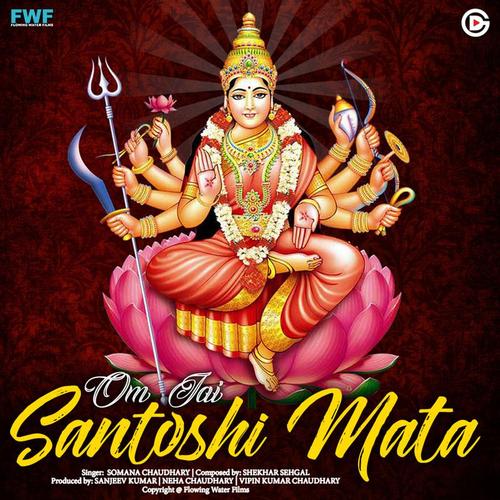Om Jai Santoshi Mata: A Deep Dive into the Devotion
Om Jai Santoshi Mata, a phrase that resonates with millions around the world, especially in Hindu communities. It is a powerful mantra that invokes the blessings of Goddess Santoshi, the embodiment of contentment and satisfaction. This article delves into the various dimensions of this devotion, exploring its origins, significance, practices, and the profound impact it has on the lives of its followers.
Origins and Significance
The mantra “Om Jai Santoshi Mata” is derived from the Sanskrit language, with each word carrying deep spiritual meaning. “Om” is a universal sound that represents the ultimate reality, while “Jai” means victory or celebration. “Santoshi” signifies contentment, and “Mata” translates to mother. Together, the mantra translates to “Oh Mother of Contentment, I celebrate your victory.” This mantra is dedicated to Goddess Santoshi, who is believed to grant the wishes of those who are truly content and have a pure heart.

According to Hindu mythology, Goddess Santoshi is the daughter of Goddess Lakshmi, the goddess of wealth and prosperity. She is depicted as a young woman with four arms, each holding a different object: a lotus, a bow and arrow, a conch, and a noose. These symbols represent her powers to bestow wealth, knowledge, protection, and control over one’s desires, respectively.
Practices and Rituals
Devotees of Goddess Santoshi follow various practices and rituals to seek her blessings. One of the most common rituals is the recitation of the “Om Jai Santoshi Mata” mantra. This mantra is chanted with devotion and faith, often accompanied by prayers and offerings. Many followers also perform aarti, a ritual involving the waving of lamps and incense sticks, to honor the goddess.
Another significant practice is the worship of Goddess Santoshi during the Navaratri festival, which is a nine-day celebration dedicated to the worship of Goddess Durga and her manifestations. During this festival, devotees perform special puja (worship) rituals, fast, and offer prayers to Goddess Santoshi, seeking her blessings for contentment and happiness in life.
| Day | Deity | Significance |
|---|---|---|
| 1st Day | Mahagauri | Power to overcome obstacles |
| 2nd Day | Shailputri | Strength and determination |
| 3rd Day | Parvati | Love and compassion |
| 4th Day | Kali | Protection and victory |
| 5th Day | Skandamata | Power to fulfill desires |
| 6th Day | Bhairavi | Strength and courage |
| 7th Day | Sati | Devotion and purity |
| 8th Day | Kumari | Youth and vitality |
| 9th Day | Durga | Ultimate power and protection |
Devotees also perform special aartis and puja rituals during the Navaratri festival, seeking Goddess Santoshi’s blessings for contentment and happiness in life. Many followers also observe fasts and offer prayers to Goddess Santoshi, seeking her blessings for contentment and happiness in life.
Impact on Lives
The devotion to Goddess Santoshi has a profound impact on the lives of her followers. Many people attribute their success, happiness, and well-being to the blessings of Goddess Santoshi.



